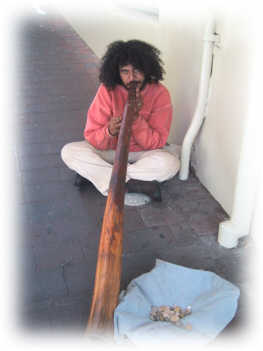 For the treatment of sleep apnea, continuous positive airway pressure (CPAP) is the most effective and widely used therapy.
For the treatment of sleep apnea, continuous positive airway pressure (CPAP) is the most effective and widely used therapy.
Now, there’s the Didgeridoo. Read the second comment and watch the video to learn how it helps.
The impetus for this study was an anecdotal report from a didgeridoo instructor who noticed that he and some of his students experienced reduced daytime sleepiness and snoring after practicing with this instrument for several months.
First, the details
- 25 snoring adults
- Some took didgeridoo lessons and practiced at home.
- The rest were placed on a waiting list for lessons.
Now, the results.
- The didgeridoo group practiced 6 days a week for 25 minutes each day.
- After 4 months, daytime sleepiness and apnea improved significantly.
- There was no effect on the quality of sleep in the patients, although their partners slept better.
- Changes in health-related quality of life did not differ between groups.
“The effect of playing the didgeridoo was slightly smaller than with CPAP therapy,” according to the researchers who “expected smaller effects because our patients were only moderately affected.”
Maybe so, but it seems that the those who benefited the most were the partners.
Perhaps the more important point is that CPAP adherence rates are often low, according to a Cochrane review. Patients sometimes discontinue CPAP therapy due to undesirable side effects, such as anxiety, insomnia, and nasal discomfort, or inconvenience. It also tends to be uncomfortable to use.
The researchers concluded, “new treatments not only need to be effective but also be ones that people are motivated enough to use.” It’s good advice, even though it’s unlikely that the vast majority of people with sleep apnea have an overwhelming desire to practice the Didgeridoo.
3/4/07 18:54 JR